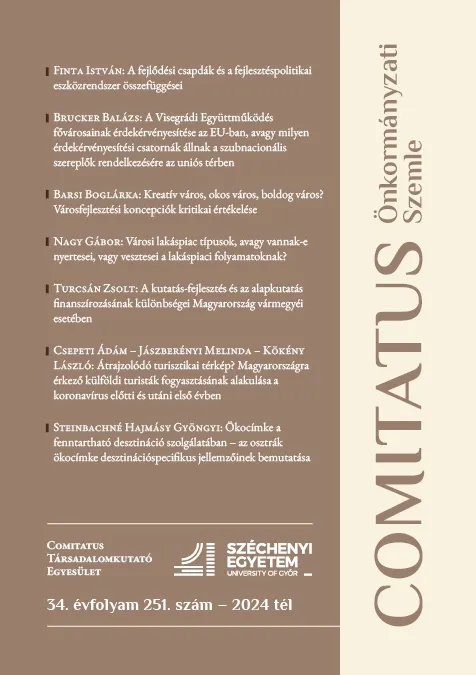Szorzás, osztás, forráslehívás
A konvergencia elvének érvényesülése Magyarországon II. Az operatív programok forrásallokációja
Multiplication, division, resource of drawdown
The principle of convergence enforcement in Hungary II. Source allocation of operational programs
| LETÖLTÉS | DOI: 10.59809/Comitatus.2023.33-246.149 |
|
Szerző: BERKES JUDIT, egyetemi docens, tudományos munkatárs, Széchenyi István Egyetem, Gazdasági Elemzések Tanszék, KRTK Regionális Kutatások Intézete, Dunántúli Tudományos Osztály, berkes.judit##kukac##sze.hu, berkes.judit##kukac##krtk.hun-ren.hu, ORCID: 0000-0002-0738-6204 |
Author: JUDIT BERKES, associate professor, research fellow, Széchenyi István University, Department of Economic Analysis, Institute for Regional Studies, Centre for Economic and Regional Studies, berkes.judit##kukac##sze.hu, berkes.judit##kukac##krtk.hun-ren.hu, ORCID: 0000-0002-0738-6204 |
|
Kulcsszavak: kohéziós politika | konvergencia | forráselosztás | regionális egyenlőtlenség JEL kód: R58 |
Keywords: cohesion policy | convergence | resource allocation | regional disparities JEL code: R58 |
Absztrakt: Az elmúlt évtizedekben az Európai Unió kohéziós politikája jelentős átalakuláson ment keresztül; a területi tervezés és fejlesztés ciklusonként változik, ezzel próbál igazodni a globális gazdaság és politika által generált kihívásokhoz. Magyarországon a 2007 és 2013 közötti programozási ciklus területi kereteit a régiók adták, és ez a tanulmány azt hivatott bemutatni, hogy a területi forrásallokáció Magyarországon mennyire tudta követni az Európai Uniós alapelveket, milyen összhangot tudott teremteni a „szükséges” és az „elégséges” pénzügyi forrás az egyes régiók között.
Abstract: In recent decades, the European Union's cohesion policy has undergone a major transformation, with territorial planning and development changing from cycle to cycle in an attempt to adapt to the challenges generated by the global economy and politics. In Hungary, the territorial framework for the 2007-2013 programming cycle was provided by the regions, and this study aims to show how far the territorial allocation of resources in Hungary has been able to follow the EU principles and how well it has been able to reconcile the 'necessary' and the 'sufficient' financial resources in each region.
IRODALOMJEGYZÉK
Bauer, Michael W.: Organizational change, management reform and EU policy-making, Journal of European Public Policy, 2008/15, 627–647. https://doi.org/10.1080/13501760802133138
Begg, Iain: Cohesion or confusion: a policy searching for objectives, Journal of European Integration, 2010/1, 77–96. https://doi.org/10.1080/07036330903375115
Berkes Judit: Szorzás, osztás, forráslehívás, A konvergencia elvének érvényesülése Magyarországon I., Tér-Gazdaság-Ember, 2017/3, 37–53.
Davies, Sara – Polverari, Laura: Financial Accountability and European Union Cohesion Policy, Regional Studies, 2011/5, 695–706. https://doi.org/10.1080/00343404.2010.529118
Dühr, Stefanie – Colomb, Claire – Nadin, Vincent: European spatial planning and territorial cooperation, Routledge, New York, 2010. https://doi.org/10.4324/9780203895290
European Commission: Directorate-General for Regional and Urban Policy, Europe 2000 – Outlook for the development of the Community’s territory: A preliminary overview, Publications Office, 1991.
European Commission: Directorate-General for Regional and Urban Policy, Europe 2000+ – Cooperation for European territorial development, Publications Office, 1994.
European Commision: EU Cohesion Policy 1988-2008: Investing in Europe’s future, Panorama 26, Inforegio, European Union Regional Policy, Brussels, 2008.
European Commision: Sixth report on economic, social and territorial cohesion, Investment for jobs and growth. Promoting development and good governance in EU regions and cities, Regional and Urban Policy. European Commission, Brussels, 2014.
EU: Consolidating versions of the Treaty on European Union and the Treaty on the Functioning of the European Union, (2010/C 83/01) EN 30.3.2010 Official Journal of the European Union, 2010/53, European Union.
European Commision: Regional Development Studies, The EU compendium of spatial planning systems and policies, European Communities, Luxembourg, 1997. Elérhető: http://commin.org/upload/Glossaries/European_Glossary/EU_compendium_No_28_of_1997.pdf (Letöltés ideje:
2017.08.02.)
https://ec.europa.eu/commission/index_hu (Európai Bizottság hivatalos honlapján elérhető adatbázisok) Letöltés ideje: 2017.11.02.
Faludi, Andreas: Cohesion, Coherence, Cooperation: European Spatial Planning Coming of Age?, Routledge, New York, 2010.
Faragó László: Stratégiai programozás 2014–2020, magyar teendők, Falu Város Régió, 2011a/2, 53–57.
Faragó László: Az Európa Kulturális Fővárosa program városfejlesztési, városirányítási tanulságai, in: Ágoston, Zoltén et al. (szerk.): Elemző értékelés Pécs2010 Európa Kulturális Fővárosa program tapasztalatairól, Pécs Megyei Jogú Város Önkormányzata, Pécs, 2011b.
Faragó László: Az EU területi politikájának a változásai közép-kelet-európai nézőpontból, Tér és Társadalom, 2016/2, 3–22. https://doi.org/10.17649/TET.30.2.2765.
Faragó László – Varró, Krisztina: Shifts in EU Cohesion Policy and Processes of Peripheralization: A View from Central Eastern Europe, European Spatial Research and Policy, 2016/1, 5–19. https://doi.org/10.1515/esrp-2016-0001.
Faragó, László – Mezei, Cecília: Managing regional disparities, in: Lux, Gábor – Horváth, Gyula (eds.): The Routledge Handbook to Regional Development in Central and Eastern Europe, 2017, 159–174.
Illés Iván: A „területi kohézió” szerepe az EU és a tagországok politikájában, in: Cieger András (szerk.): Kötőerők: Az identitás történetének térbeli keretei, Atelier Francia-Magyar Társadalomtudományi Központ, Budapest, 2009, 87–101.
Kassim, Hussein: Mission impossible, but mission accomplished: the Kinnock reforms and the European Commission, Journal of European Public Policy, 2008/5, 648–668. https://doi.org/10.1080/13501760802133146
Magyarország Partnerségi Megállapodása a 2014-2020 fejlesztési időszakra. Elérhető: https://www.palyazat.gov.hu/download.php?objectId=52032 (Letöltés ideje: 2017.10.10.)
Medeiros, Eduardo: Territorial Cohesion: An European Concept, European Journal of Spatial Deve-
lopment, 2016a/60. Elérhető: http://www.nordregio.se/Global/EJSD/Refereed articles/refereed60.pdf, https://doi.org/10.5281/zenodo.5141339
Medeiros, Eduardo: Is there a rise of the territorial dimension in EU Cohesion policy, Finisterra, 2016b/103, 89–112. https://doi.org/10.18055/Finis7940
Mendez, Carlos: The Lisbonization of EU Cohesion Policy: A Successful Case of Experimentalist Governance?, European Planning Studies, 2011/3, 519–537. https://doi.org/10.1080/09654313.2011.548368
Molle, Willem: European cohesion policy, Routledge, Abingdon, 2007. https://doi.org/10.4324/9780203945278
Brakel, Marion, van den – Reinder, Lok: The Robin Hood Index Adjusted for Negatives and Equivalised Incomes, Journal of Official Statistics, 2021/4, 1047–1058. https://doi.org/10.2478/jos-2021-0044


